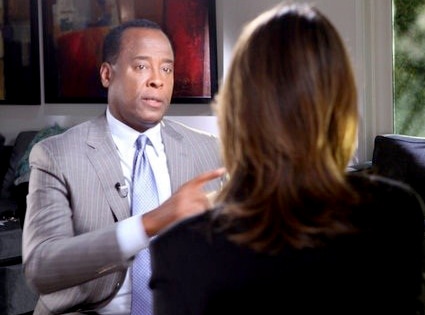 CARLY SEGAL/NBC
CARLY SEGAL/NBCConrad Murray may never have taken the stand in his involuntary manslaughter trial, but that doesn't mean he didn't want the opportunity to defend himself to his many critics (a group that now includes a jury of his peers).
With that in mind, Michael Jackson's doctor sat down with the Today show—prior to the jury rendering a guilty verdict, it should be noted—and for the first time, spoke extensively about the details surrounding the pop star's death, his use of propofol and what, if any, responsibility he accepts.
NBC News' Savannah Guthrie was tasked with quizzing Murray in the interview, which will air in two parts this week, and began with the day Jackson died. She asked if he could really have been properly monitoring his patient given his recorded history of emails, texts and phone calls at the most critical juncture of time.
Was he distracted?
"No, I was not," Murray said, before going on to defend his actions. "When I looked at a man who was all night deprived of sleep, who was desperate for sleep, and finally is getting some sleep, am I gonna sit over him, sit around him, tug on his feet, do anything unusual to wake him up? No."
He acknowledged that he walked out of the room to make phone calls, and that he "could not see" Jackson or, more critically, hear if he stopped breathing, but said, "I would think if he got up and he called to me, I would hear him.
"But he was not on an infusion that would cause him to stop breathing, and that's the reason they talk about I was not supposed to be monitoring him at that time, because there was no need for monitoring."
Facts would beg to differ.
As for why, as the prosecution made clear in their case against the doctor, he waited so long in dialing 911, he seemed to argue that he was simply saving time, and that to tell security to phone emergency services would require a back-and-forth that Murray did not want to allocate for.
"No one is allowed to come upstairs except for Mr. Jackson. His security is not allowed in the house…'Call 911' would still require him to call me back. I don't think he would do that, and I'm not about to leave a full explanation on the phone."
As he proved, explanations are not something Murray is big on, as he dismissed concerns that he withheld information about Jackson's propofol dosing to paramedics.
"And that's a very sad reason, because it was inconsequential," he said by way of explaining why he did not reveal the medication. "Twenty five milligrams and the effects gone. Means nothing…It had no effect. It was not an issue."
Meanwhile, Guthrie also questioned Murray on what seems to universally be considered an extreme deviation from the standard of care, his home administration of propofol.
We'll give him this: for better or worse, Murray is sticking to his guns.
"I think propofol is not recommended to be given in the home setting, but it is not contraindicated," he said, defending his use of the sedative. "I looked at my condition with Michael not as I—not as about giving it, but trying to find a method to take away something from him, that I felt he should not have been using on his own."
Though he stopped short of admitting wrongdoing, he did seem to acknowledge that he had doubts about his behavior.
"I should have walked away. But if also I walked away, I would have abandoned a friend."
He also reiterated his defense that he had, to his mind, successfully weaned Jackson off of propofol just three days before his death, and was no longer administering the drug to his patient.
"Well, I tell you what. When the death happened, three days towards the, towards his death, he was weaned off, and I was success—I was extremely happy, because I finally achieved the state I wanted. The state was, Michael away from propofol."
As the world now knows, that state—if it ever existed—didn't last long.
Guthrie went on to hammer Murray on whether or not he thought he bore any responsibility for Jackson's death, which he has been careful not to concede. Taking a hypothetical route, she asked if he still thought he bore no responsibility even if, as he has long claimed, Jackson self-administered the fatal dose—after all, if that happened, the propofol was only in the room because Murray had prescribed it in the first place.
"This is the situation," he said. "It's difficult to think that I met Michael with a situation where he was absolutely having use of that substance long before I got there."
When Guthrie told him to "own your portion" of his passing, he simply replied, "Mm-hmm."
"Well, I'm gonna say, that was not a foreseeable situation," he began, before Guthrie interrupted with an incredulous, "It wasn't?"
"No. Had I known what I know today in retrospect, that Mr. Jackson was an addict, and he had shared that information with me, addicts may behave in a way that is unreasonable and you may consider it."
He went on to acknowledge that Jackson was a desperate man: "desperate for sleep."
"And you left him alone with propofol?" Guthrie asked.
"He was, he was asleep," Murray replied.
The interview airs in its entirety over two days on Today, tomorrow and Friday.